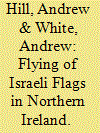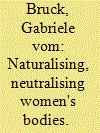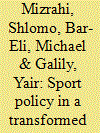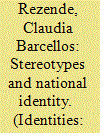|
|
|
Sort Order |
|
|
|
Items / Page
|
|
|
|
|
|
|
| Srl | Item |
| 1 |
ID:
080667


|
|
|
|
|
| Publication |
2008.
|
| Summary/Abstract |
In the spring of 2002 Israeli flags began to appear in loyalist communities in Northern Ireland. The appearance of these flags was in one respect explained as a response to the increased prevalence of Palestinian flags in nationalist neighbourhoods. However, the appearance and continued display of the Israeli flag can be seen to extend beyond a "wholly relational" dynamic to encompass the connotations this flag has come to possess for those who fly it in regard to the contemporary political situation within Northern Ireland and events on the international stage in the context of the United States' post-September 11 "War on Terror." At the same time, the flying of the Israeli flag in Northern Ireland provides a graphic demonstration of the increased prevalence of political symbolism in the post-Troubles era and the way in which groups in Northern Ireland have sought to reference and draw upon similar conflict situations for their own agendas.
|
|
|
|
|
|
|
|
|
|
|
|
|
|
|
|
| 2 |
ID:
080666


|
|
|
|
|
| Publication |
2008.
|
| Summary/Abstract |
This essay explores reactions to the 1996-1997 incarceration of R is n McAliskey, a young Irish republican, pregnant at the time of her arrest. The case revealed tensions and contradictions in the politics of gender, national identity, and reconciliation at a tentative stage in the Northern Ireland peace process. Special attention is given to the negotiation of the case by the politically diverse Northern Ireland Women's Coalition and other activists who worked to forge broad-based support campaigns. Along with reactions to them, these efforts were diagnostic of the challenges of developing new politics during this transitional period. These included prospects for new gender-based alliances as well as the potential and the limitations of human rights and political recognition to contribute to projects of reconciliation. For some activist women, the McAliskey case was unsettling to their own sense of political identity, a disruption that may be understood as symptomatic of the intersubjective quality of recognition. It suggests that, although demands for recognition are often most salient in ethnic or nationalist "conflict zones," the dilemmas attached to extending recognition may be especially acute in just such contexts, where both political subjectivity and physical safety have often hinged on avoiding ambiguity. Similarly, human rights are frequently presented as vehicles for peacemaking. When the state's legitimacy is the focus of conflict, however, demands for human rights often appear as attacks on the state and, by implication, those who identify with it.
|
|
|
|
|
|
|
|
|
|
|
|
|
|
|
|
| 3 |
ID:
080669


|
|
|
|
|
| Publication |
2008.
|
| Summary/Abstract |
Through ethnographic and historical inquiry, this article inspects the usefulness of the concept of hybridity for an analysis of Rio's samba and carnaval. If differentiated from mesti agem, the concept of hybridity can productively be put to use. The discourse on mesti agem is the basis for dominant narratives of national identity and celebrates samba and other Afro-Brazilian cultural forms as symbols of Brazilianness and racial democracy. Such political use of culture was initiated by President Vargas's appropriation of subaltern performance genres in his populist project of modernity. At the same time, as expressions of Afro-Brazilian culture, samba and carnaval are contested performances; many celebrate the "racially democratic" character of samba spaces as a core domain of Afro-Brazilian sociability. This article traces the roots of samba and carnaval in Rio de Janeiro and examines their current import for a politics of identity by drawing from interviews and fieldwork at escola de samba Unidos da Cereja. The article stresses the methodological importance of addressing multiple practices and voices emerging in the context of samba performances. The concept of hybridity can thus describe Afro-Brazilians' use of culture in the negotiation of power imbalances and alternative values
|
|
|
|
|
|
|
|
|
|
|
|
|
|
|
|
| 4 |
ID:
080668


|
|
|
|
|
| Publication |
2008.
|
| Summary/Abstract |
The recent "headscarf affair" has created a divisive national crisis in several European countries. Like Turkey, France and Germany have introduced legislation prohibiting "conspicuous" religious symbols in government institutions. The article argues that interpretations of 'Muslim' female head covering as a sign of oppression ignore their resemblance to European symbols of ideal womanhood. The question of the 'ethnicity' of the symbol is thus elusive, and the assertion of categorical difference can be challenged on the level of citizenship law. Recent amendments to German citizenship law based on jus sanguinis have eased immigrants' adoption of citizenship, diminishing the contrast with the French jus soli. Thus, in Germany there has been a shift from the emphasis on the transmission of substance toward display of cultural competence through other forms of embodiment. In both Germany and France, in key social locations of state reproduction, national belonging and loyalty to the state must be demonstrated through linguistic competence and modes of bodily performance that mainly focus on women
|
|
|
|
|
|
|
|
|
|
|
|
|
|
|
|
| 5 |
ID:
080671


|
|
|
|
|
| Publication |
2008.
|
| Summary/Abstract |
This article describes the impact of socio-political transformation processes on sport policy through the Israeli experience. A framework was developed for analyzing learning processes, utilizing the argument that under highly centralized systems, citizens' preferences regarding any area of life, including sport, are strongly affected by governmental policy. We show that in Israel the lack of a significant sport policy during the centralized formative years of the State influenced citizens' long-term preferences regarding sport, in the sense that it was regarded as a marginal issue that did not trigger demands for policy change. We explain that the marginality of sport in Israeli society also continued when the nature of relations between citizens and politicians was transformed from a top-down to a bottom-up orientation.
|
|
|
|
|
|
|
|
|
|
|
|
|
|
|
|
| 6 |
ID:
080670


|
|
|
|
|
| Publication |
2008.
|
| Summary/Abstract |
In this article, I examine how stereotypes are deployed in the process of experiencing national identities. Specifically, I analyse how a group of Brazilian academics who have studied in Europe and the United States have dealt with stereotypical notions of Brazilians as "warm people" who establish friendship "easily." Ideas about a "greater emotionality," which were often seen as negative from a European colonial perspective, are embraced and re-signified by them as a positive feature of Brazilian national identity, particularly when compared to the supposed "closed nature" of some Europeans. I argue therefore that the presence of such stereotypes contributes to reinforce a subjective sense of Brazilianess and also reveals the negotiations of power relations in the process of elaborating Brazilian national identity
|
|
|
|
|
|
|
|
|
|
|
|
|
|
|
|
|
|
|
|
|